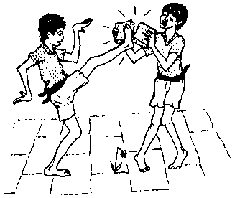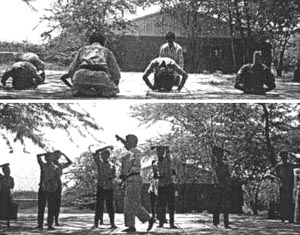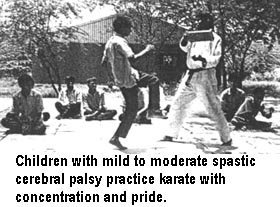CHAPTER 41
Karate for Fun (and Therapy)
for Children with Cerebral Palsy

In many countries today, children are fascinated by karate and
eager to learn this ancient, artful form of self-defense. Youngsters with
cerebral palsy share this fascination with karate - but rarely have a
chance to learn it.
In The Spastics Society of Tamilnadu (SPASTN), an innovative
program in southeast India, children with mild to moderate cerebral palsy
are taught karate. They take it very seriously. Likewise their trainers,
who are volunteer professional karate instructors, take the children and
their learning seriously.
At its best, karate is a physical art which teaches its disciples
self-mastery of body and mind, as well as a philosophy of harmony and
non-aggressive self-defense. Its guided rhythmic movements conform with
many of the therapeutic movements and positioning used for children with
cerebral palsy.

Seeing these children proudly demonstrate their karate skills is a
mind-altering revelation, even to those of us who work routinely with
disabled kids. It awakens us to the children's hidden potentials. We learn
that, when they are challenged with an activity that they passionately
want and choose to do, it is astonishing what they can accomplish.
Observing their concentration and unexpected grace as they perform this
ancient art stretches the boundaries of what therapists, care-takers, and
the children themselves dream is possible. For doer and viewer alike, it
is a liberating experience.

The karate program at SPASTN was initiated by karate master Shihan
Hussaini, who is also trained in social work and guidance counseling. The
parents are delighted with the results, and teachers are amazed.
Observable,benefits are many: better coordination (both gross and
fine), improved behavior and attention span, and a greater sense of
personal adequacy, positive self image, feeling of fulfillment, and
self-confidence. |